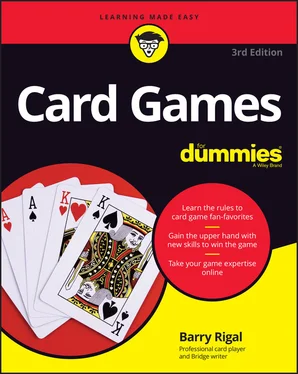 The bidding at games such as Euchre, Pinochle, or Bridge should be distinguished from the betting at Poker or Blackjack. At Pinochle or Bridge, players must predict how many points or tricks, respectively, they can take, with penalties if they overestimate their hands’ values. In games such as Spades or Oh Hell!, underestimation is similarly penalized. However, at Blackjack, you have to pay to play, without seeing your hand. At Poker, by contrast, although you must put up a stake in order to stay in the game and receive cards, the real expenditure comes after the initial bet, when you have to pay to stay in the game.
The bidding at games such as Euchre, Pinochle, or Bridge should be distinguished from the betting at Poker or Blackjack. At Pinochle or Bridge, players must predict how many points or tricks, respectively, they can take, with penalties if they overestimate their hands’ values. In games such as Spades or Oh Hell!, underestimation is similarly penalized. However, at Blackjack, you have to pay to play, without seeing your hand. At Poker, by contrast, although you must put up a stake in order to stay in the game and receive cards, the real expenditure comes after the initial bet, when you have to pay to stay in the game.
Are you the impatient type? Want to score points even before the game play begins? Well, some games have a declaration phase, in which you score points for combinations of cards that are worth certain amounts based on a predetermined table of values unique to the game. You can accumulate these points in a game like Pinochle, and sometimes an exchange of cards is permitted to improve your score on the hand.
 Having a number of consecutive cards in the same suit is called a run or sequence. Having three or four cards of the same rank (obviously in different suits, unless you have more than one deck of cards in play, in which case there are no such restrictions) is called a set or book.
Having a number of consecutive cards in the same suit is called a run or sequence. Having three or four cards of the same rank (obviously in different suits, unless you have more than one deck of cards in play, in which case there are no such restrictions) is called a set or book.
The most important phase of most card games resides in the play of the hand. In many of the games in this book, the objective is to try to accumulate points — or, in a game like Hearts, to try to avoid accumulating points.
The standard way of accumulating or avoiding points derives from the concept that a game is made up of several distinct phases; in each phase (except for certain games like Poker and Blackjack), players detach cards from their hands and put them face-up on the table, in order. Whoever plays the highest card in the suit led usually gets to collect all those cards and stack them face-down in front of them. This unit of playing cards is called a trick — your success in many competitive card games hinges on how many tricks you win during the course of play. (Again, however, some games in the book, such as Setback, feature trying to win specific valuable cards rather than simply trying to obtain the majority of the tricks.)
So the high card takes the trick. But how do you get to that point? Here are the steps that get you there:
1 The first player to act makes the opening lead, or the lead to the very first trick.Depending on the rules of the game, the elder hand (the player to the dealer’s left), the dealer, or the player who selected the contract during the bidding process makes the opening lead.
2 The player who wins the trick generally leads to the next trick and so on throughout the hand, until everyone plays all their cards.The order of play nearly always follows a clockwise or occasionally counterclockwise pattern in relation to the deal or the winner of the trick.
The player who wins the trick makes the next lead and scores or avoids points. But it doesn’t always take the high card to win the trick, and sometimes you make mistakes during the course of a hand. The following sections detail tricks and penalizing treats.
Winning with high cards or trump
The concept that the highest card played on a trick wins the trick is a simple one, but it doesn’t do justice to the rules of most games in this book. Each has more complex rules than that. For example, in most games, it isn’t simply the high card that wins the trick; it’s the highest card in the suit led.
My point is that most games (but not all!) state that when a player leads a suit — say, spades — all subsequent players must play spades if they still have one in their hands. This concept is called following suit.
So what happens if you can’t follow suit? Well, here is where the concept of the trump suit comes in. Many of the trick-taking games have a trump suit, which has special powers. You may like to think of this as the “boss” suit, which outranks all the other suits. In games such as Whist, you select the boss suit at random. In other games, such as Euchre, the initial suit is random, but the players have a chance to select another suit if they want to. And in some games, such as Bridge, the choice is entirely up to the players playing individually or acting in a partnership.
 So, what do trumps do? Well, if you have no cards in the suit led, you can put a trump on the lead (or trump it ). This action is also called ruffing the trick. Consequently, the importance of the trump suit lies in the fact that the smallest trump can beat even the ace of any other suit. So, if a trick doesn’t have any trumps in it, the highest card of the suit led takes the trick; however, if one or more trumps hit the table on a trick, the highest trump takes the trick.
So, what do trumps do? Well, if you have no cards in the suit led, you can put a trump on the lead (or trump it ). This action is also called ruffing the trick. Consequently, the importance of the trump suit lies in the fact that the smallest trump can beat even the ace of any other suit. So, if a trick doesn’t have any trumps in it, the highest card of the suit led takes the trick; however, if one or more trumps hit the table on a trick, the highest trump takes the trick.
Most games have rules that require you to play a card in the suit led if you can; and indeed, that is your ethical requirement. However, if you can follow suit but don’t, you incur no penalty — you only face a penalty for being caught failing to follow suit! The penalty varies from game to game but is generally a pretty severe one.
In failing to follow suit, you have three terms to bear in mind:
Revoke: The sinful failure to follow suit when you’re able is known as revoking or reneging. (The latter term seems to be exclusive to the United States and is now synonymous with the revoke.)
Trump: Putting a card from the trump suit down when a suit is led, in which you have no cards. If you play a trump, you stand to win the trick — so long as no one else subsequently plays a higher trump.
Discard: The laying down of an off-suit card when you’re unable to follow suit is called a discard or renounce, although the former term is more common these days. Discarding implies that you’re letting go a card in a plain, non-trump suit rather than trumping.
Say your hand consists solely of clubs, diamonds, and hearts, and you’re playing out a hand where hearts are trump:
If another player leads a club and you play a diamond or a heart on the lead, you revoke.
If a player leads a spade and you play a heart, you trump the spade.
If you play a diamond on the lead of a spade, you discard.
For one reason or another, players occasionally lose track of who won the previous trick. If a player neglects to remember that they are supposed to lead, a potentially long and embarrassing pause ensues until someone plucks up enough courage to ask that player whether they’re thinking about what to do next or if they’re spacing out.
More frequently, however, somebody leads out of turn, under the false impression that the action is on them. If this happens, the general rule is that the next player can accept that lead by following to the trick, if they want to do so. Alternatively, they may be so hypnotized by the sight of the card that they may genuinely think it’s their turn to play, so they follow suit innocently.
Either way, the general rule is that the next player’s following legitimizes the original mistake. However, some games state that up until the faulty trick is completed, if anyone spots the error, you still have time to pick the whole trick up and correct the error.
Читать дальше

 The bidding at games such as Euchre, Pinochle, or Bridge should be distinguished from the betting at Poker or Blackjack. At Pinochle or Bridge, players must predict how many points or tricks, respectively, they can take, with penalties if they overestimate their hands’ values. In games such as Spades or Oh Hell!, underestimation is similarly penalized. However, at Blackjack, you have to pay to play, without seeing your hand. At Poker, by contrast, although you must put up a stake in order to stay in the game and receive cards, the real expenditure comes after the initial bet, when you have to pay to stay in the game.
The bidding at games such as Euchre, Pinochle, or Bridge should be distinguished from the betting at Poker or Blackjack. At Pinochle or Bridge, players must predict how many points or tricks, respectively, they can take, with penalties if they overestimate their hands’ values. In games such as Spades or Oh Hell!, underestimation is similarly penalized. However, at Blackjack, you have to pay to play, without seeing your hand. At Poker, by contrast, although you must put up a stake in order to stay in the game and receive cards, the real expenditure comes after the initial bet, when you have to pay to stay in the game.










